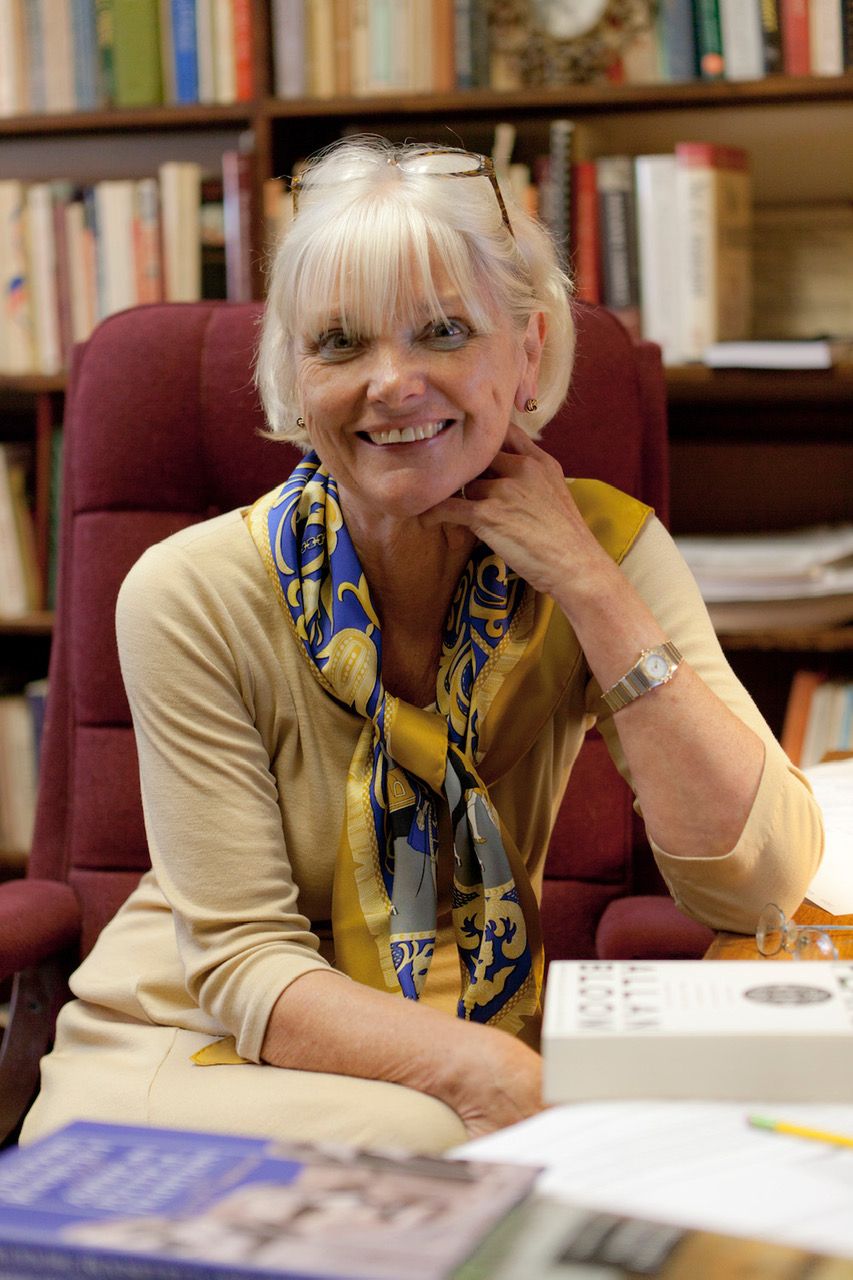Itt a legfrissebb közvélemény-kutatás: így áll most a Fidesz és a Tisza Párt

Továbbra is zajlik a közvélemény-kutatások „háborúja”, utánajártunk, mekkora a valós különbség a Fidesz és a Tisza között.

“And what makes it possible to forego providing for even their own defense? Partly, utopian fantasies of peace and partly reliance on the military might of the United States, whose work-obsessed citizens underwrite their more relaxed “lifestyles” – Jean Yarbrough pointed out in a conversation with Lénárd Sándor on the challenges before the unique European and American way of life.

The Claremont Institute recently launched an interesting project that aims to explore the unique American way of life. What values or virtues could be considered as integral parts of this life?
The overall mission of the Claremont Institute is to restore to American political life the centrality of the principles underlying the Declaration of Independence and the Founders’ Constitution. This means, above all, an appreciation for limited government dedicated to the protection of the natural rights of all individuals as well as a love of the country that defends these rights.

Although the Declaration of Independence asserts that the primary aim of government is “to secure these rights,” the American Founders also believed that republican
self-government depends upon an enlightened and virtuous citizenry.
In his Farewell Address, George Washington reminded his fellow citizens that “religion and morality” were the “indispensable supports” and “great pillars” of our prosperity and happiness. It is no wonder, then, that Alexis de Tocqueville would emphasize that in America the “spirit of religion” and the “spirit of freedom” work in tandem to secure democratic rights.
In addition to shoring up the political principles of the Founders, the Claremont Institute also focuses on strengthening those institutions, especially the family, schools, and religious organizations that transmit these principles to the young.

The past decade or so revealed a sharp divide in the United States in terms of values and worldview. Many say that the country has become extremely polarized while other thinkers point out that it has actually two constitutions or at least two very different versions of the Constitution. How do you see this growing divide in America?
The two divisions you speak of are related. Since the beginning of the Progressive Era at the end of the nineteenth century, critics have objected to the structure of the original Constitution, especially its separation of powers, federalism, and cumbersome procedure for amendments that have made it difficult to effect radical change, even incrementally. Famously, Woodrow Wilson criticized the Framers’ Constitution for taking its bearings too much from physics, in which forces mutually check and restrain each other. He argued that we should view the Constitution organically, that is, as a charter that adapts to changing economic and social conditions and evolves beyond the natural rights liberalism of the Founders to meet these new challenges. What he and other Progressives, including the Republican Theodore Roosevelt, supported was the gradual shift of power away from the localized Congress and toward a supposedly non-partisan expert class of administrators who would more reliably advance their progressive aims. Over time,
the administrative state has come to supplant—or at least to challenge-- the separation of powers and federalism of the original constitutional design.
Unlike the institutions the Framers designed, the agencies, bureaus, and commissions of the administrative state combine legislative, executive, and judicial powers, making it much easier to implement their political aims. What’s more, the people who staff these administrative posts are neither elected nor accountable to the voters. Unlike elected officials, they enjoy civil service protections that make it very difficult, if not impossible, to remove them from office. So, in that sense we have two constitutions operating at the same time and on different political principles, though until the 2016 presidential election this had never been much on the political radar.
How does it impact American life?
While all this was unfolding on the constitutional front, critical theory had slowly been taking hold in the law schools and in higher education. It was Herbert Marcuse, a student of Heidegger, a participant in the Frankfurt School, and a teacher of Angela Davis, who popularized a modification of Marxism in the United States.
Instead of class conflict, Marcuse recast the struggle in broadly cultural terms, dividing Americans in terms of their racial, ethnic, and gender identities,
with whites, especially white men, cast as the oppressors and favored minorities as the oppressed. Although critical race theory (CRT) is the best known, critical theory has proved eminently adaptable to feminists, gays and lesbians, Asians, and other “marginalized” groups, displacing traditional Marxism's interest in the working class. Critical theory found favor with the Obama presidency, and after the death of George Floyd in the summer of 2020, charges of “systemic racism” came to dominate the public discourse. In response, the Biden administration has made Diversity, Equity, and Inclusion a centerpiece of its domestic policy. One finds DEI in higher education, the legal academy, Hollywood, the mainstream media (MSM), as well as in corporate America. But what finally provoked a backlash was when parents discovered during the year or more that their children were being instructed remotely that CRT had seeped into the curriculum of our entire educational system beginning in kindergarten and elementary school. Public, private, parochial, it doesn’t matter; CRT is everywhere. So, now there is a lively debate about how these neo-Marxist principles of equity (which considers all disparities and inequalities the result of systemic racism and therefore unjust) and discrimination in favor of the marginalized can be reconciled with the principles of equal rights announced in the Declaration and guaranteed by the Constitution.
How do you see the role of growing centralization along with the broadening administrative state in this divide and polarization?
Many of the federal policies promulgated through the administrative agencies are readily embraced by “blue” (Democratic) states that share the same political goals. But even those “red” (Republican) states that oppose these policies find themselves limited because they are hostages to federal dollars. The same centralizing tendencies also operate on the local level, where citizens find they have little or no say on matters of great concern: the education of their children, public safety, and local zoning measures. These matters are now largely under the supervision of state bureaucrats, who in turn take their cues from their counterparts at the federal level. This is
the administrative centralization that Tocqueville warned against in Democracy in America.
But in his day Tocqueville saw administrative centralization as a danger in his native France; America then offered the counter example of an active citizenry exercising their political liberties. When one reads his famous discussion of “The Kind of Despotism Democratic Nations Have to Fear” today, his warning applies just as much to America as it does to much of Europe.
In the words of David Goodheart’s formulation, we are witnessing a rift between the “Somewheres” and the “Anywheres” in the Western World. While the “Anywheres” have no longer real attachments to local communities, the “Somewheres” insist on their roots and traditions. What are the importance of local communities, nations, and patriotism in preserving values of Western societies?
David Goodheart is obviously on to something important. As more and more young people leave home to attend college, they are introduced to the romance of global citizenship, and many find the prospect of employment far from home appealing. In the United States, this is especially true of elite colleges (such as Bowdoin, where I teach) and universities that attract a national and even international student body, already committed to “global values.”
Yet I am also struck by the great number of college-educated Americans who attend state universities close to home and prepare for careers that will enable them to secure good jobs near where they grew up.
They WANT to return to their roots.
We don’t hear so much about them, as we usually think of the “somewheres” as the people who didn’t go to college. But there is no question that the “somewheres” and the “anywheres” are two very different sensibilities, and we find them both in America as well as in Europe. Bicoastal America looks down on the more religious and “backward” flyover country in the middle of the United States, much as elites in Western Europe condescend to their partners in the East.
Let’s turn to Europe where the challenges are no less significant than in the United States. Besides having doubts and debates about a unique European way of life, Europe as continent went through a decade long crisis period throughout the 2010s, and the EU lost one of its strategically and economically important member states. In addition to Brexit, there are still other visible cracks in the EU. One that stands out is the crack between the “old” Europe before the eastward enlargement and the “new” Europe after the eastward enlargement. How do you see this crack from overseas?
I vividly recall being in London when the Maastricht Treaty that created the European Union was being debated. It was always going to be very difficult to fold the ancient nations of Europe into one political union, and more difficult still as the EU expanded. Not only do these countries have very different histories, but they speak many different languages, and belong to different Christian denominations (to say nothing of the more recent divide introduced by Islam). Moreover, the omission of any mention of Europe’s Christian heritage in its draft of the preamble to the European constitution accentuated the differences between the “new” Central and Eastern European states and the “old” members in the West. But even in western Europe, the transfer of sovereignty from historic nations to bureaucrats in Brussels has produced more resistance than partisans of European Union anticipated. Brexit brought that home spectacularly. Here, especially, the divide between the “somewheres,” who resented the mounting intrusions of Brussels bureaucrats on their way of life, and the “anywheres,” who love their new-found freedom to live and work throughout the EU, seems especially salient. What’s more,
Brexit helped to sharpen these divisions
in France, Italy, and other “old” members of the EU.
Furthermore, the newly established rule of law mechanism tends to increase the centralization by placing a lot of power in the hands of the Court of Justice of the European Union. What are its threats based on the American experience?
It is an unfortunate fact that
“he who pays the piper calls the tune.”
The recent decision of the European Court of Justice is really not a surprise. The wealthy states that underwrite the EU will use financial support to Hungary to force her to comply with EU norms as they interpret them. This is similar to the plight of red states in America. The federal government controls the flow of federal dollars.
The Hungarian Prime Minister aims to pursue policies that protect traditional European virtues and way of life. How do you see the recent efforts that Hungary is trying to make in order to make the country as well as Europe more competitive and strong?
It is good for the members of the European Union to be reminded of their own failings. As far back as 1848, Tocqueville warned the French against the evils of socialism and the corrosive effects of philosophical materialism.
Is it any wonder that a secular and socialist West should have lost any concern with procreation?
It is far easier and more pleasant to live for the moment.
And what makes it possible to forego providing for even their own defense?
Partly, utopian fantasies of peace and partly reliance on the military might of the United States,
whose work-obsessed citizens underwrite their more relaxed “lifestyles.” The Trump administration made some attempt to force the Europeans to honor their financial commitments to their mutual defense, but it was too short-lived and haphazard to bring about any real changes to European security. If anything, the Biden administration has pursued contradictory goals, making the Germans more dependent on Russian gas, while at the same time allowing them to fall back into arrears on their NATO contributions. Having lived under Soviet domination, East European countries have a different perspective on these challenges. Their love of freedom and embrace of their once suppressed religious and national traditions will appeal to conservatives in the “old” Europe and win new admirers in the United States, but they will face strong headwinds from their progressive western partners who welcome open borders and a world without nations.
What role the Central European approach might or should play in the future of Europe, especially after the UK left the EU?
As I see it, though keep in mind I have never visited your country, Hungary faces two challenges: first) the challenge of secular materialists who look down on the customs and mores of what they regard as a backward and illiberal nation and second) the need to build up a strong economic base to support the family-friendly policies and ethnic immigration it seeks to pursue. Yet these challenges also provide Hungary and other “new” members of the EU with an opportunity:
they can provide an alternative for those in in the “old” Europe who wish to reinvigorate their own cultural and political traditions.
And they can establish closer partnerships with Americans who are curious to learn more about this “new” Europe. For the US, Brexit has meant that the country with which we have long had a “special relationship” would no longer be part of the internal EU foreign policy discussions. America sorely needs new best friends inside the EU, and the Trump administration understood that they are most likely among the Central European nations. That approach may return after the next presidential election.